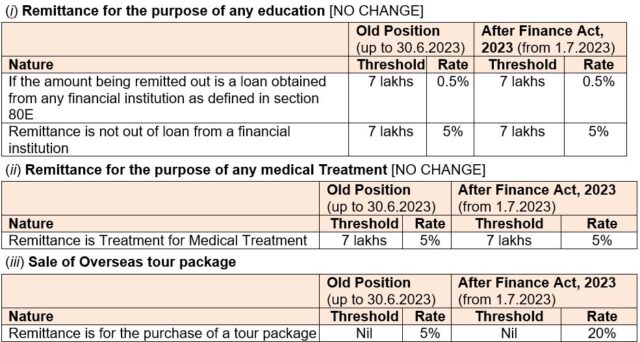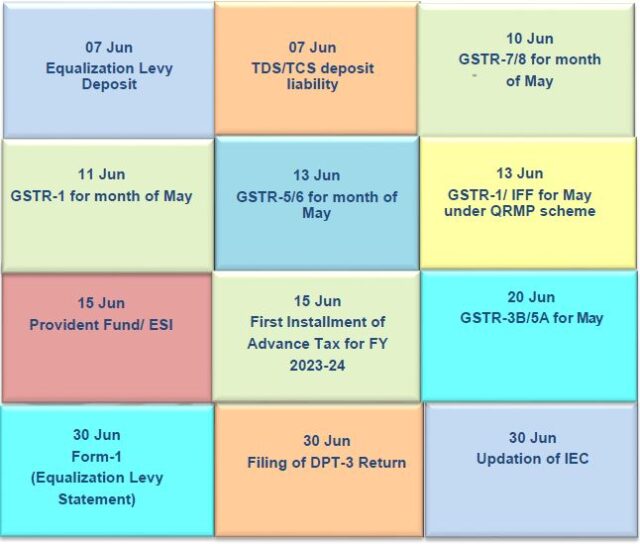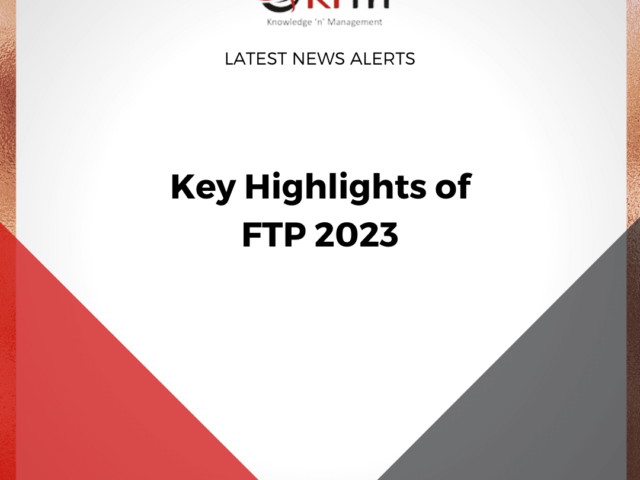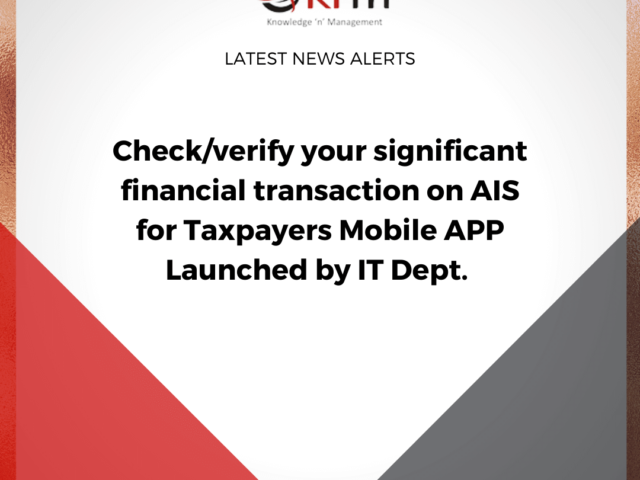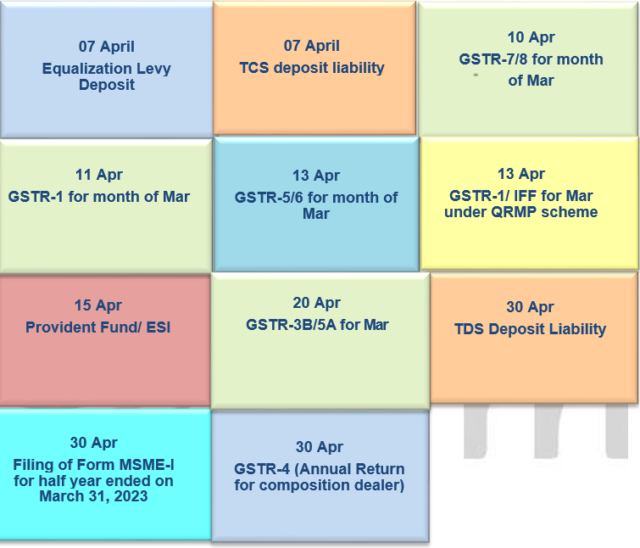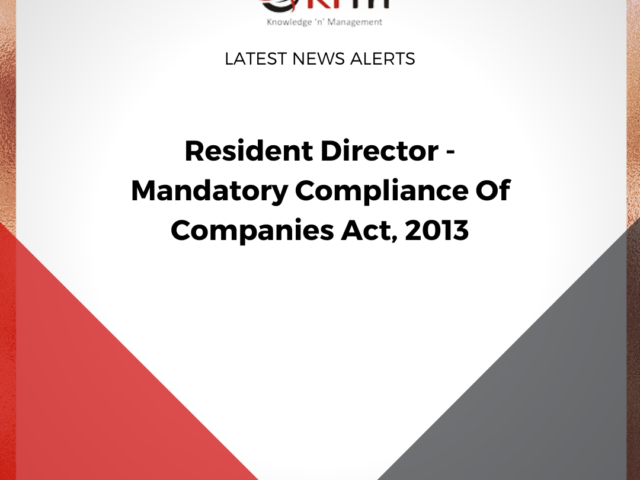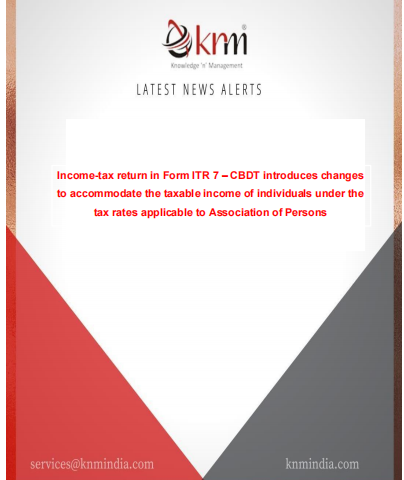
2023Income-tax return in Form ITR 7 – CBDT introduces changes to accommodate the taxable income of individuals under the tax rates applicable to Association of Persons
Executive Summary
Income Tax
- Income-tax return in Form ITR 7 – CBDT introduces changes to accommodate the taxable income of individuals under the tax rates applicable to the Association of Persons (AOP)
- Supreme Court’s decision (in the case of Bharti Hexacom Ltd) on the treatment of a one-time entry fee & variable annual license fee paid by telecom operators as capital expenditure
- The Central Board of Direct Taxes (CBDT) has notified the pension fund, BPC Penco XVII Corporation, for exemption under section 10(23FE).
- CBDT issued instructions regarding the revision of timelines and monetary limits as well as the revision of workflow in the matter of recording reasons before withholding refunds u/s 245(2) or the Income-tax Act, 1961.
- The Central Government has made important changes to the popular Senior Citizen’s Savings Scheme (SCSS).
- Central Government (CG) further amended the National Savings Time Deposit Scheme, 2019.
- CG makes the scheme further amend the Public Provident Fund Scheme, 2019, regarding the allowance of the interest period.
- Central Board of Direct Taxes (CBDT) amends guidelines for submission of Statement of Financial Transactions (SFT) for depository transactions & mutual fund transactions by registrar & share transfer agent.
- Agreement between India & Saint Vincent & the Grenadines for exchange of information & collection of taxes.
Goods And Service Tax (GST)
- Clarification relating to the export of services.
- Amendment in CGST Rules.
- Issues relating to the taxability of personal guarantee and corporate guarantee.
- GST rate on imitation zari thread or yarn.
- Place of Supply in case of respective services.
Companies Act 2013/ Other Laws
- SBOs behind LLPs are all set to surface.
- MCA appoints the date of enforcement for Section 5 of the Companies (Amendment) Act,2020.
- RBI issues Master Direction (Non-Banking Company – Scale Based Regulation) Directions, 2023.
- SEBI Board Meeting: Key Approvals for Social Stock Exchange, Index Providers & Real Estate Investments.
INCOME TAX
- Income-tax return in Form ITR 7 – CBDT introduces changes to accommodate the taxable income of individuals under the tax rates applicable to the Association of Persons (AOP)
CBDT has introduced certain changes in Form ITR-7, to accommodate the taxable income of individuals under the tax rates applicable to AOP, which aligns with the slab rates applicable to individuals. The amendment is applicable from Assessment Year (AY) 2023-24 onwards.
(a) Changes in Part B- TI: Sl No. 16 to be substituted as below:
- Specified income chargeable u/s 115BBI, included in 13, to be taxed @30% (Sl. No 7 of Schedule 115BBI)
- Aggregate income to be taxed at normal rates (13-14-15-16) (including income other than specified income under section 115BBI)
(b) in Part B-TTI, against serial number 1, for item a and entries relating thereto, the following item and entered thereto, shall be substituted, namely: —
“a Tax at normal rates on [Sl. No. 17 of Part B1 of Part B-TI] OR [Sl. No. (13 -14) of Part B2 of Part B-TI] OR [Sl. No. 13 of Part B3 of Part B-TI] 1a”.
- Supreme Court’s decision (in the case of Bharti Hexacom Ltd) on the treatment of one-time entry fees & variable annual license fees paid by telecom operators as capital expenditure
Telecom operators at the time of set-up of telecom infrastructure incur two types of license fees – Fixed and Variable. The fixed license fee is a one-time fee paid to acquire the right to operate the telecommunication services. Variable license fees are paid annually as a percentage of gross revenue. As per section 35ABB of the Income-tax Act, payments made for acquiring any right to operate telecommunication services (whether such payment is made before the commencement of the business to operate or thereafter at any time during the year) will be allowed as a tax deduction in amortized manner.
Supreme Court invoked the test of ‘nature of original obligation’ to determine the nature of the variable annual license fee, and held that while classifying the nature of the expense, it is important to analyze whether the subsequent payment made in installments has a direct nexus with the original obligation or not. In the instant case, the successive payment of a variable annual license fee has a nexus with the original obligation, i.e. consideration for the right to establish, maintain, and operate telecommunications services. The nature of payment that was made for the same purpose cannot have a different characterization merely because of a change in the manner of payment.
In view of the above, the one-time entry fee as well as the variable annual license fee paid by the taxpayer are capital in nature and will be amortized under section 35ABB of the Act.
- The Central Board of Direct Taxes (CBDT) has notified the pension fund, BPC Penco XVII Corporation, for exemption under section 10(23FE)
The notified funds shall be eligible to claim the exemption in respect of eligible investment made in India on or before 31-03-2024 subject to prescribed conditions. Some of them are
(i) The assessee shall file a return of income, for all the relevant previous years falling within the period beginning from the date in which the said investment has been made and ending on the date on which such investment is liquidated, on or before the due date specified for furnishing the return of income under sub-section (1) of section 139 of the Act;
(ii) the assessee shall furnish along with such return a certificate in Form No. 10BBC in respect of compliance to the provisions of clause (23FE) of section 10 of the Act, during the financial year, from an accountant as defined in the Explanation below sub-section.
(2) of section 288 of the Act, as per the provisions of clause (vi) of rule 2DB of the income-tax Rules, 1962;
(iii) the assessee shall intimate the details in respect of each investment made by it in India during the quarter within one month from the end of the quarter in Form No. 10BBB, as per the provisions of clause (v) of rule 2DB of the Income-tax Rules, 1962;
(iv) The assessee shall maintain a segmented account of income and expenditure in respect of such investment which qualifies for exemption under clause (23FE) of section 10 of the Act;
(v) The assessee shall continue to be regulated under the law of the Government of Ontario, Canada; and any other conditions as prescribed.
- CBDT issued instructions regarding the revision of timelines and monetary limits as the revision of workflow in the matter of recording reasons before withholding refunds
The monetary limit for applying provisions of section 245(2) of the Income-tax Act, 1961 will hereinafter be where the value of the refund is Rs. 10 lakhs or more. In any case where section 245(2) of the Act is applicable, the Faceless Assessing Officer (FAO), on receipt of communication from CPC, shall intimate the Jurisdictional Assessing Officer (JAO) about demand likely to be raised in the pending assessment(s). The JAO, based on such information shall record in writing, with proper application of mind, and after analyzing the factual matrix of the case seek approval of the jurisdictional Principal Commissioner of Income-tax. The reasons recorded shall not be cursory. Such reasons should reflect the factual analysis of the case by the JAO. The JAO will communicate the final decision regarding the release of the refund to the CPC. To finish this process, the time limit is hereby revised to 20 days for the Faceless Assessment Unit and to 30 days for Jurisdictional Assessing Officer.
- The Central Government has made important changes to the popular Senior Citizen Savings Scheme (SCSS).
(i) Retirement benefits may now be invested in the SCSS within three months of retirement for a retired person who is over 55 but under 60. Formerly, after receiving retirement benefits, a retired person had to invest within a month.
(ii) The financial aid amount may now be invested in the program by a spouse of a government employee who passed away while performing their duties. If the deceased government employee was employed and reached the age of fifty, then this will be permitted. This benefit is being given to all central and state government employees eligible for retirement benefits or death compensation.
(iii) As per changes defined, Retirement benefit means any payment due to the account holder on account of retirement on superannuation or otherwise and includes Provident Fund dues, retirement or superannuation or death gratuity, commuted value of pension, cash equivalent of leave, savings element of Group Savings Linked Insurance Scheme payable by the employer on retirement, retirement-cum-withdrawal benefit under the Employees’ Family Pension Scheme and ex-gratia payments under a voluntary or a special voluntary retirement scheme and in case, if the employee dies in harness, the “retirement benefits” shall also mean the above-mentioned benefits to an employee who died in harness.
(iv)According to the new regulations, if the account is closed before the investment’s one-year term expires, one percent of the deposit will be withheld. Prior regulations stated that interest on the account’s deposit should be recouped from the deposit and the account holder would receive the whole amount if the account was closed before a year had passed.
(v) The account holder may keep extending the account for an unlimited number of blocks, each lasting three years. Furthermore, for each extension, the application must be submitted. The extension could only be granted once in the past. Regardless of when the application was received, the extension shall be taken into consideration as of the date of maturity or the conclusion of each three-year block term.
(vi)The deposit made at the time of opening of the account shall be paid on or after the expiry of five years or after the expiry of each block period of three years where the account was extended from the date of opening of the account. Provided that after the closure of the existing account or accounts, new accounts or accounts may be opened again as required by the depositor subject to the maximum deposit limit.
- Central Government further amended the National Savings Time Deposit Scheme, 2019
In the exercise of the powers conferred by section 3A of the Government Savings Promotion Act, the Central Government substituted Paragraph 8 regarding the Premature closure of the account. Premature closure of an account shall be allowed on an application by the account holder in
Form-4 is subject to the following conditions, namely:—
- a) no deposit shall be withdrawn before the expiry of six months from the date of deposit;
- b) where a deposit in a one-year, two-year, or three-year account is withdrawn prematurely after six months, but before the expiry of one year from the date of deposit, interest shall be payable to the account holder at the rate applicable to Post Office Savings
Account for the completed months;
c) where a deposit in a two-year or three-year account is withdrawn prematurely after the expiry of one year from the date of deposit, interest on such deposit shall be payable to the account holder for the completed years and months, commencing on the date of deposit and ending with the date of withdrawal, and such interest shall be calculated at the rate which shall be less by two percent. points than the rate specified for a deposit of one year or two, as the case may be, and interest for the completed year shall be calculated on the quarterly compounding basis per the provisions of paragraph 7, and for any part of a year, interest shall be payable as per the provisions of subparagraph (b);
d) Where a deposit in a five-year account is withdrawn prematurely after four years from the date of opening of an account, interest shall be payable at the rate applicable to Post Office Savings Account; and
e) any interest already paid on the deposit under paragraph 7 shall be recovered from the amount of repayment of the deposit and the interest payable under this paragraph.
- CG makes the scheme further amend the Public Provident Fund Scheme, 2019, regarding the allowance of the interest period.
In exercise of the powers conferred by section 3A of the Government Savings Promotion Act, 1873, the Central Government hereby makes a Scheme to further amend the Public Provident Fund Scheme, 2019, in paragraph 13, in the second proviso, for the words “or the date of extension of the account”, the words “or from the date of commencement of the current block period of five years” shall be substituted.
This means that the interest will be allowed in the account at a rate that will be 1% less than the interest that has been periodically credited to the account from the date of commencement of the current block period of five years.
- Central Board of Direct Taxes (CBDT) amends guidelines for the submission of Statements of Financial Transactions (SFT) for depository transactions & mutual fund transactions by registrar & share transfer agent
CBDT has issued a corrigendum to notifications no 3 and 4 published in April 2021, amending the norms relating to the filing of SFTs as below:-
- With effect from 1 April 2023 onwards, SFT will be required to be submitted half-yearly instead of quarterly. In other words, data for the half-year ended 30 September will be required to be submitted by 31 October; data for the half-year ended 31 March will be required to be submitted by 30 April
- The holding period for Unit Trust of India (UTI) units has been set at 12 months if over 35% of the proceeds are in domestic equity shares. For business trust and other units, the holding period is 36 months under the same conditions.
- Effective from 1 April 2023 onwards, if a UTI unit, business trust, and other units invest 35% or less of its total proceeds in the equity shares of domestic companies, it will always be classified as a short-term capital asset
- The corrigendum includes market-linked debentures in the classification of short-term capital assets starting from 1 April 2024 onwards.
- Regarding SFT in depository transactions, the corrigendum specifies that for each debit transaction, the matching credit should be identified using the First in First Out (FIFO) method. The estimated acquisition cost for the credit should be calculated using the weighted average price of the asset. This involves considering the actual transaction value if the purchase was made after 1 February 2018, or the end-of-day price if the purchase was made before that date, as available with the depository. The corrigendum further clarifies that the estimated acquisition cost is considered NIL for off-market purchases, corporate actions, or any transactions outside the Exchange. Additionally, IPO credits will be regarded as market credits, with the acquisition cost calculated using the formula ‘number of allotted shares x per unit price at the time of allocation.
- Agreement between India & Saint Vincent & the Grenadines for exchange of information & collection of taxes. An agreement for the exchange of information was signed between the Government of India and Saint Vincent & the Grenadines on 19 May 2022. The said agreement was entered into force on 14 February 2023 and notified by the Central Government on 1 November 2023.
Goods & Services Tax
As per Notification No. 52/2023–Dated 26/10/2023 The Central Government on the recommendation of the council makes the following amendments in CGST Rules 2017 namely—
- The value of the supply of services by a supplier to a recipient who is a related person, by way of providing a corporate guarantee to any banking company or financial institution on behalf of the said recipient, shall be deemed to be one percent of the amount of such guarantee offered, or the actual consideration whichever is higher.
- In Rule 142, the words “proper officer shall issue an order”, and the words “proper officer shall issue an intimation” shall be substituted, and in Rule 159 the words “or on expiry of a period of one year from the date of issuance of an order whichever is earlier,” shall be inserted.
- In Form GST REG-01 a clause shall be inserted – “One Person company”
- Order of cancellation of registration as Tax deductor/Collector at Source classified in Form REG-08.
- Amendments in Form GSTR-8 – Statement for Tax Collection at Source.
- Amendments in Form PCT-01 – Application for Enrolment as GST Practitioner.
As per Circular No. 202/14/2023-Dated 27/10/2023, It provides clarification related to exports of services through the Vostro account for consideration of supply under section 2(6) of the IGST act 2017.
- For settlement of trade transactions with any country, AD Bank in India may open a Special Rupee Vostro Accounts of correspondent bank/s of the partner trading country. In order to allow settlement of international trade transactions through this arrangement, it has been decided that:
- Indian importers undertaking imports through this mechanism shall make payment in INR which shall be credited into the Special Vostro account of the correspondent bank of the partner country, against the invoices for the supply of goods or services from the overseas seller /supplier.
- Indian exporters, undertaking exports of goods and services through this mechanism, shall be paid the export proceeds in INR from the balances in the designated Special Vostro account of the correspondent bank of the partner country.”
- Invoicing, payment, and settlement of exports and imports are also permissible in INR subject to compliances as under RBI’s A.P.
As per Circular No. 203/15/2023-Dated 27/10/2023, It provides clarification on the Place of Supply in the case of Exports under section 13 of the IGST Act 2017, Representations have been received from the trade and field formations seeking clarification on certain issues concerning the determination of place of supply in case of –
- Place of supply in case of a supply of service of transportation of goods, including through mail and courier, in cases where the location of the recipient of services is available, the place of supply of such services shall be the location of the recipient of services and in cases where the location of the recipient of services is not available in the ordinary course of business, the place of supply shall be the location of supplier of service.
- Place of supply in case of supply of services in respect of advertising sector- (i) There may be a case wherein there is supply of space or supply of rights to use the space on the hoarding/structure (immovable property) belonging to vendor to the client then the place of supply would be the location where such hoarding/ structure is located.
(ii) There may be another case where the advertising company wants to display its advertisement on hoardings/billboards at a specific location availing the services of the vendor. Therefore, such services provided by the Vendor to the advertising company are purely in the nature of advertisement services in respect of which the Place of Supply shall be determined in terms of Section 12(2) of the IGST Act.
- Place of supply in case of supply of the “co-location services”- the place of supply of the colocation services shall be determined by the default place of supply provision under sub-section (2) of Section 12 of the IGST Act i.e., location of the recipient of co-location service.
However, in cases where the agreement between the supplier and the recipient is restricted to providing physical space on rent along with basic infrastructure without components of Hosting and IT Infrastructure provisioning services, the place of supply shall be the location of immovable property.
As per Circular No. 204/16/2023-DATED 27-10-2023 It deals with taxability and valuation of the activity of providing corporate guarantee by a related person to banks/financial institutions for another related person, as well as by a holding company in order to secure credit facilities for its subsidiary company.
- The activity of providing personal guarantee by the Director to the banks/ financial institutions for securing credit facilities for their companies is to be treated as a supply of service, even when made without consideration, the taxable value of such supply of service shall be the open market value of such supply.
- The activity of providing corporate guarantee by a holding company to the bank/financial institutions for securing credit facilities for its subsidiary company, even when made without any consideration, is also to be treated as a supply of service the taxable value will be determined as per rule 28 of CGST Rules.
As per Circular No. 205/17/2023- DATED 31-10-2023, It provides clarification on the GST rate on imitation Zari thread or yarn based on the recommendation of the GST council in its 52nd meeting held on 7-10-2023 The GST Council has recommended clarifying that imitation Zari thread or yarn made from metalized polyester film/plastic film falling under HS 5605 are covered by Sl. No. 218AA of Schedule I attracting 5% GST. The GST Council has also recommended that no refund will be permitted on polyester film (metalized)/plastic film on account of the inversion of the tax rate.
As per Circular No. 206/18/2023-GST -Dated 31-10-2023 The clarifications with reference to GST levy, related to the following issues are being issued through this circular.
- The input services in the same line of business include the transport of passengers or renting of motor vehicles with the operator and not leasing of motor vehicles without the operator which attracts GST and/or compensation cess at the same rate as a supply of motor vehicles by way of sale.
- When electricity is being supplied bundled with renting of immovable property and/or maintenance of premises, as the case may be, it forms a part of the composite supply and shall be taxed accordingly. The principal supply is the renting of immovable property and/or maintenance of the premise, and the supply of electricity is ancillary.
- Job works services with the manufacture of malt are covered under “job work concerning all food and food products falling under chapters 1 to 22 of the customs tariff” irrespective of the end use of that malt and attract 5% GST and not 18% under job work concerning alcoholic liquor.
- It is clarified that DMFTs set up by the State Governments are Governmental Authorities and thus eligible for the same exemptions from GST as available to any other Governmental Authority.
- Supply of pure services and composite supplies by way of horticulture/horticulture works (where the value of goods constitutes not more than 25 percent of the total value of supply) made to CPWD are eligible for exemption from GST.
As per Notification No. 53/2023- DATED- 2-11-2023 It Provides special for the class of persons who failed to file an appeal against the order passed by the proper officer under sections 73 and 74 within the prescribed time limit the said person shall file an appeal against the the said order in FORM GST APL-01 per sub-section (1) of Section 107 of the said Act, on or before the 31st day of January 2024-
- After submitting such part of the amount of tax, interest, fine, fee, and penalty arising from the impugned order, as is admitted by him, or;
- A sum equal to 12.5% of the remaining amount of tax in dispute arising from the said order, subject to a maximum of 25 crore rupees, out of which at least twenty percent should have been paid by debiting from the Electronic Cash Ledger.
No appeal under this notification shall be admissible for a demand not involving tax and no refund will be processed until the appeal is disposed-off.
As per Notification No. 54/2023- DATED 17-11-2023 Section 25 of the Central Goods and Services Tax act, 2017, read with rule 8 of the Central Goods and Services Tax rules, 2017 – registration – procedure for – specified states or union territories for the words, “State of Gujarat and the State of Puducherry”, the words “States of Andhra Pradesh, Gujarat, and Puducherry” shall be substituted.
Companies Act, 2013/LLP Act, 2008
SBOs behind LLPs are all set to surface
The new LLP SBO rules, akin to what companies currently, follow, introduce a similar framework for Limited Liability Partnerships (LLPs). This means that LLPs will now be required to adhere to SBO declarations and maintain registers, just like companies. The objective remains the same i.e. to ensure transparency and accountability by identifying and disclosing the individuals who ultimately hold the beneficial interest and steer the decision-making within LLPs. The idea is to uncover the intricate networks of holdings and cross-holdings, a practice commonly employed to hide the identity of the individual (s) owning an entity.
MCA appoints the date of enforcement for Section 5 of the Companies (Amendment) Act,2020
Ministry of Corporate Affairs appoints 30th October 2023 as the date of enforcement for Section 5 of the Companies (Amendment) Act,2020 relating to the amendment of Section 23 (Public officer and private placement) of the Companies Act,2013.
RBI
RBI issues Master Direction (Non-Banking Company – Scale Based Regulation) Directions, 2023
The Reserve Bank of India (RBI) issued the much-awaited Master Direction – Reserve Bank of India (Non-Banking Financial Company – Scale Based Regulation) Directions, 2023 (MD) on 19 October 2023. The MD has been issued in supersession of the existing Master Directions Systemically Important and Non-Systemically Important NBFCs.
RBI has followed a streamlined approach by consolidating the provisions of the Master Directions applicable to Systemically and Non-Systemically important NBFCs, certain provisions of the Scale Based Regulatory Framework for NBFCs, and the related circulars released by the RBI periodically, into one single Master Direction. All the NBFCs, except the expressly exempt ones shall be governed by this MD.
RBI has established a layered approach with incremental obligations being assigned to each layer, as the NBFC progresses based on its asset size, scale of activity, and perceived riskiness. For ease of reference, the MD is divided into sections applicable to different categories of NBFCs, viz. NBFC-Base Layer, NBFC-Middle Layer, NBFC-Upper Layer, etc. depending upon size and function.
SEBI
SEBI Board Meeting: Key Approvals for Social Stock Exchange, Index Providers & Real Estate Investments
The SEBI Board’s recent decisions mark a significant shift in regulatory dynamics, aiming to foster transparency, inclusivity, and investor protection. These changes not only reflect SEBI’s commitment to adapt to evolving market needs but also set the stage for a more robust and responsive securities market in India. Investors, NPOs, and market participants can anticipate a more flexible and dynamic landscape with these forward-thinking regulatory adjustments.

Disclaimer: Information in this note is intended to provide only a general update on the subjects covered. It is not intended to be a substitute for detailed research or the exercise of professional judgment. KNM accepts no responsibility for loss arising from any action taken or not taken by anyone using this publication. Updates are till the period 26 November 2023.

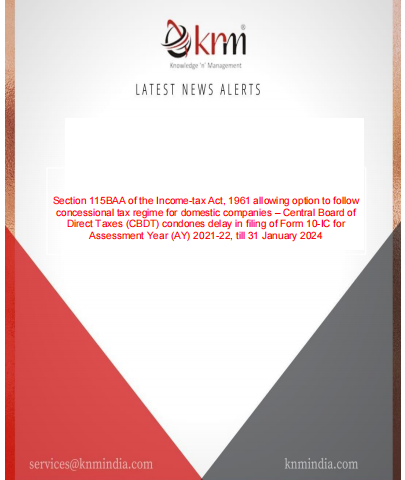
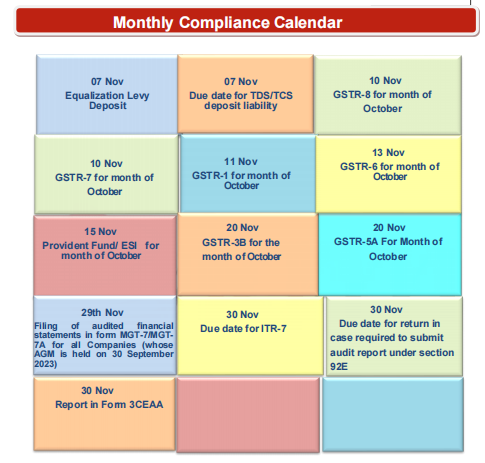

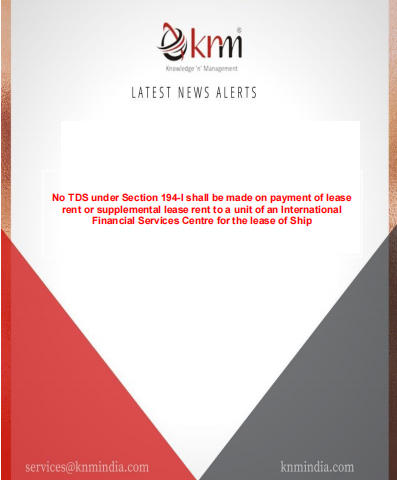
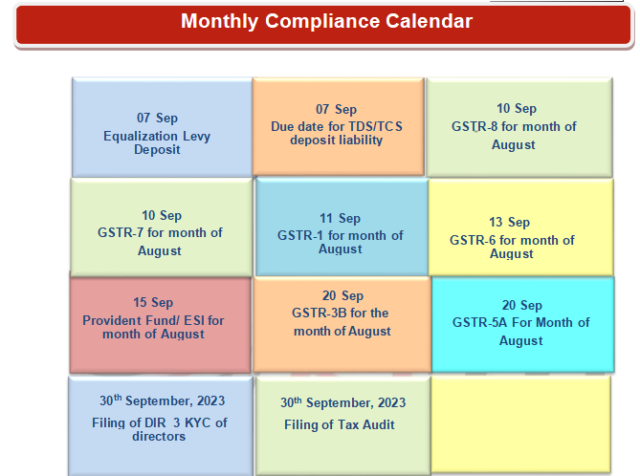
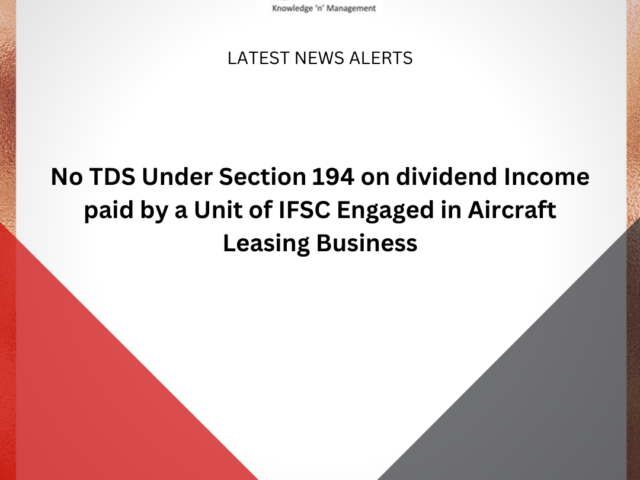
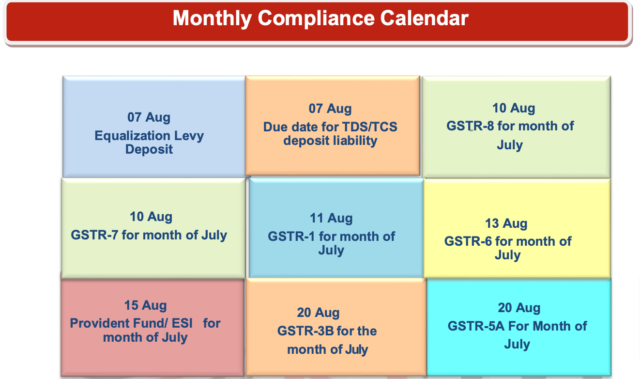
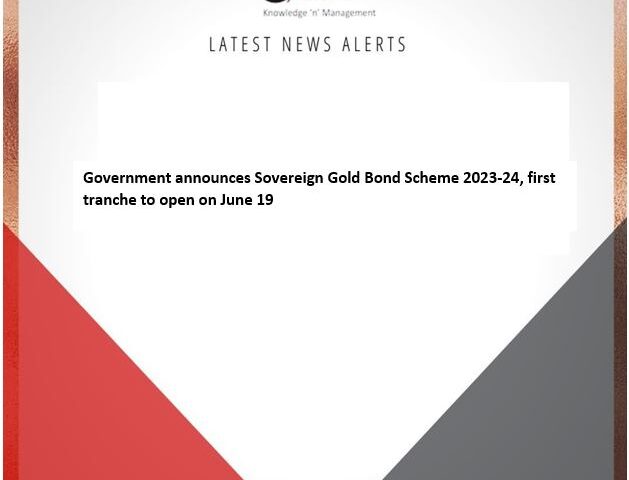
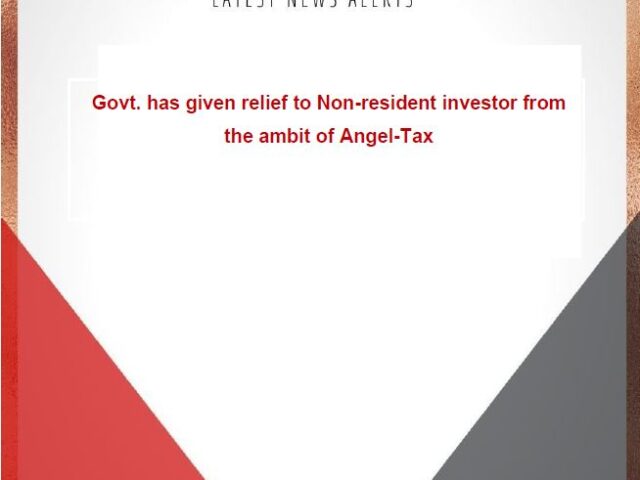
 • CBDT vide Press Release dated 19.05.2023 has clarify that the use of international credit cards for meeting his/her expenses by a person when he is abroad will come under the purview of LRS, earlier only Debit card was covered. Further, to avoid any procedural ambiguity, it has been decided that any payments by an individual using their international Debit or Credit cards upto Rs. 7 lakhs per financial year will be excluded from the LRS limits and hence, will not attract any TCS. Existing beneficial TCS treatment for education and health payments will also continue.
• CBDT vide Press Release dated 19.05.2023 has clarify that the use of international credit cards for meeting his/her expenses by a person when he is abroad will come under the purview of LRS, earlier only Debit card was covered. Further, to avoid any procedural ambiguity, it has been decided that any payments by an individual using their international Debit or Credit cards upto Rs. 7 lakhs per financial year will be excluded from the LRS limits and hence, will not attract any TCS. Existing beneficial TCS treatment for education and health payments will also continue.